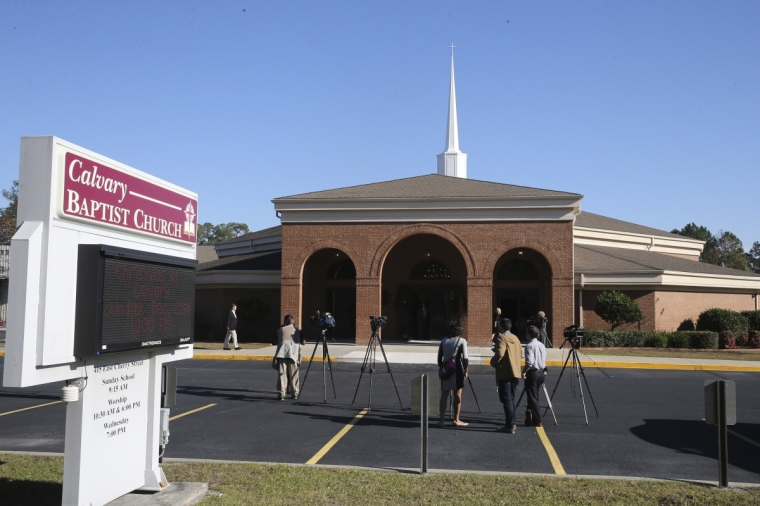COMMENTARY: Have Southern Baptists needlessly tossed brand identity for #ihavenoideawhatkindofchurchthisis?

SYLACAUGA, Ala. (Christian Examiner) — Imagine Coca-Cola replacing their red and white cans with blue and yellow ones or McDonald's replacing their golden arches with silver pyramids. Organizations invest huge sums of money over many decades to project a very specific image before the culture. For years, Southern Baptists have been running away from our image at lightning speed, rejecting our brand at every single structural level. We are becoming less Southern, less Baptist and less of a Convention. Perhaps not so coincidentally, matters of late have not been going particularly well.

Historically, what is this brand? Southern Baptists are a Bible believing, gospel sharing, values voting, alcohol abstaining, cantata learning, offering plate passing, fried chicken eating people. We are predominantly rural and suburban. We are not cool or chic or avant-garde. We reject overly complex interpretations of Scripture. We love God, country, church and family. We look with suspicion upon those who claim we don't understand our doctrine, our faith or our culture. We are simple without being simplistic. We are honest without being rude. In a society that views us as old-fashioned, moralistic and overly conservative, we simply believe that the Bible is right, the culture is wrong and everybody needs Jesus.
Southern Baptists are a Bible believing, gospel sharing, values voting, alcohol abstaining, cantata learning, offering plate passing, fried chicken eating people. We are predominantly rural and suburban. We are not cool or chic or avant-garde. We reject overly complex interpretations of Scripture. We love God, country, church and family.
While the above description applies to most of the SBC, we do branch out with some type of variety as to location, language, ethnicity, worship style, doctrinal viewpoints and so on. But the trick is to branch out while still retaining a faithful connection to the brand. Today, Coca-Cola offers Diet Coke, Cherry Coke, Coke Zero and other products, but each one remains tethered to the overall brand. The company learned its lesson years ago after introducing the poorly named soft drink Tab, which is no longer popular. In part, the SBC is reeling today because so many of our churches are like Tab. People don't even know who we are. Whether the world loves us or hates us—and Jesus said they will hate us because they hate Him—we are better off if they know who we are than if they don't.
Over the past several decades we have taken measures to deemphasize our label at every major structural level—our new church plants, our established churches, our convention agencies and our denomination itself. At a micro level, keeping our denominational identity a guarded secret may have helped the cause of evangelism in certain church settings—although this hypothesis is difficult to prove and may be greatly exaggerated. However, at the macro level, such an approach of running from our brand rather than sticking up for it and promoting it has clearly hurt the Southern Baptist Convention as a whole. Oddly enough, organizations apparently ashamed of themselves and everything they stand for have been known to face practically insurmountable obstacles in getting their message across. Who knew?
Church Plant Level
Nearly all the new churches Southern Baptists are starting today have names like Sojourn Community Church, Mosaic Church, Horizon Church, Powerhouse Church, Reservoir Church, Garden of Grace, The Vineyard, The Gathering or The Church at Some Place or Other. Generally speaking, a newcomer at one of these churches would be terribly hard pressed to find out it is a Southern Baptist Church. In some important respects, it may not be very Southern Baptist at all.
Few of these churches are 100% sponsored by Southern Baptists. Many of them possess loyalties divided among a number of co-sponsoring partners, including evangelical organizations like Acts 29 or the Leadership Network and even other denominations—a popular arrangement among ethnic church plants. In other words, our Southern Baptist dollars are pouring into these churches and providing funds that mutually benefit Christian organizations outside SBC life. It is quite impossible to discern whether these Hybrid Church Plants are more loyal to the Southern Baptist brand or to the other co-sponsoring networks and denominations.
From the standpoint of brand promotion, the Southern Baptist Convention is rolling out our newest and most exciting products without any brand identification whatsoever. While Apple is introducing their next iSomething, Southern Baptists are introducing our next iHaveNoIdeaWhatKindOfChurchThisIs. Our church plant branding has so watered down the soup that people who taste it cannot identify any Southern Baptist flavor at all. We may be marketing ourselves into oblivion.
Established Church Level
Perhaps the easiest way to document the profound rejection of our denominational brand among the established churches of the Southern Baptist Convention is to consider a simple table comparing two lists of church names. The first column shows the list of churches whose Pastors were invited to preach at the SBC Pastors Conference in 2000. The second column shows the corresponding list from 2014.
The contrast is as striking as the conclusion is self-explanatory. In 2000, only 8% of the churches represented at the SBC Pastors Conference did not include the word "Baptist" in their name. In 2014, that percentage was 78%. Without either affirming or denying a causative relationship, history is bound to record that in the early years of the Twenty-First Century, the evangelistic and financial decline of the Southern Baptist Convention directly correlated with a clear repudiation of its denominational label among many of the leading churches in the convention
| 2000 SBC PASTORS CONFERENCE | 2014 SBC PASTORS CONFERENCE |
| First Baptist Church, Orlando, FL | First Baptist Church, Woodstock, GA |
| First Baptist Church, Naples, FL | Shiloh Metropolitan Baptist Church, Jacksonville, FL |
| First Baptist Church, Jacksonville, FL | The Church at Brook Hills, Birmingham, AL |
| Idlewild Baptist Church, Tampa, FL | Cross Church, Northwest, AR |
| Hoffmantown Church, Albuquerque, NM | Epiphany Fellowship, Philadelphia, PA |
| First Baptist Church, Snellville, GA | The Summit Church, Raleigh-Durham, NC |
| Second Baptist Church, Hot Springs, AR | Oak Cliff Bible Fellowship, Dallas, TX |
| First Baptist Church, Merritt Island, FL | Saddleback Church, Lake Forest, CA |
| First Baptist Church, Gardendale, AL | Harvest Bible Chapel, Rolling Meadows, IL |
| Wedgwood Baptist Church, Fort Worth, TX | |
| Bellevue Baptist Church, Memphis, TN | |
| First Baptist Church, Woodstock, GA |
Convention Agency Level
Of the four structural levels, the convention agencies are the easiest organizations to give a free pass for rebranding themselves. Frankly, if Guidestone can sell more insurance and retirement policies than the Annuity Board of the Southern Baptist Convention, and if LifeWay can sell more books than the Sunday School Board of the Southern Baptist Convention, relatively little is lost in the process. A greater concern lies within the various partnerships embraced by these agencies, which appear to belong increasingly less to Southern Baptists and more to others.
Unsettling connections exist today between some of our SBC agencies and outside groups. Southern Seminary is very cozy with Sovereign Grace churches—formerly considered an outside denomination but now part of the SBC. As a result of this alliance, the reformed charismatic students from Sovereign Grace's Pastors College are now eligible for the same Cooperative Program discounted seminary rates that students from traditionally Southern Baptist churches receive.
This is a bit like Coca-Cola offering their benefits package to Pepsi employees. Outside denominations and networks alike have learned that if they will only annex themselves—in name only and with a token gift to the SBC—they too can line up at the trough and enjoy a Cooperative Program provided buffet, courtesy of faithful Southern Baptists who have paid into this system for years, and whose brand of Christianity differs markedly from many of these formerly outside groups.
We appear to be less Baptist at the ERLC, as evidenced by the hiring, on day one of Russell Moore's tenure, of five individuals—only two of whom were Southern Baptists at the time, while all five were Gospel Coalitionists. NAMB has also employed an officer who was not Southern Baptist, albeit terminating him later and offering him an outside consulting role. LifeWay not only publishes many books not written by Southern Baptist authors, but they also employ conference speakers at camps from outside our convention. Several of our entities support evangelical conferences such as Exponential, which promote various non-Southern Baptist speakers, leaders and ministries. Our IMB even trains many non-Southern Baptists. It is harder for a Southern Baptist politician to get invited to an ERLC forum than it is for liberal, pro-choice, pro-gay marriage, possibly treasonous Hillary Clinton. These entities feel increasingly less Southern Baptist with each passing day.
Denominational Level
By 2012, Southern Baptists had become obsessed with this notion of distancing ourselves from our brand. With all the fuss, one would think that hundreds if not thousands of churches and agencies were ready to change their denominational affiliation to Great Commission Baptist. At the convention in New Orleans, 53% of voting Southern Baptists favored allowing the option while 46% opposed it. Only a handful of churches actually adopted the descriptor. I did hear that one young lady changed her Facebook religious affiliation to Great Commission Baptist, so at least some good came from this very time consuming effort.
Essentially, the new name was defeated without being defeated. Technically, it passed. Practically, no one is using it. Perhaps the tide is turning. We have at least decided we are going to be Southern Baptists. We can admit our brand exists. Now is a great time for us to invest significant resources in helping people understand that our brand is a good thing and not a bad thing. It is worth the trouble to do so.
Conclusion
When my wife married me, she was unashamed to take my name and identify with me. It was and is an act of loyalty and love. I pray the day will soon come when all Southern Baptists are proudly identifying with our name as well. In fact, we should encourage the faithful use of our name not only at the denominational level, but also among our agencies, established churches and new church plants. If there is work to be done, in the culture at large, to explain to all our secular prospects that Southern Baptists are not the evil miscreants portrayed on CNN, then let us roll up our sleeves and take the time to do this work, explaining all that is good within the SBC rather than abandoning this task by taking shortcuts.
If Southern Baptists will only stop running from our brand, instead embracing it joyfully, we will discover that it is far easier for all of us to move forward in a positive direction together. Perhaps then we will more effectively spread, in a distinctively Southern Baptist manner, the life-changing message of the gospel. Once we are all on board with the notion that Southern Baptists are the real thing, we can bring Baptist back, restoring the good name of our denominational brand. Then, by God's grace, we can finally teach the world to sing in perfect harmony.
Rick Patrick is the publisher of the blog, SBC Today and the founder and executive director of Connect316. He is pastor of a Southern Baptist Church in Alabama and a graduate of Dallas Theological Seminary and Southwestern Baptist Theologial Seminary. This commentary is used with permission.